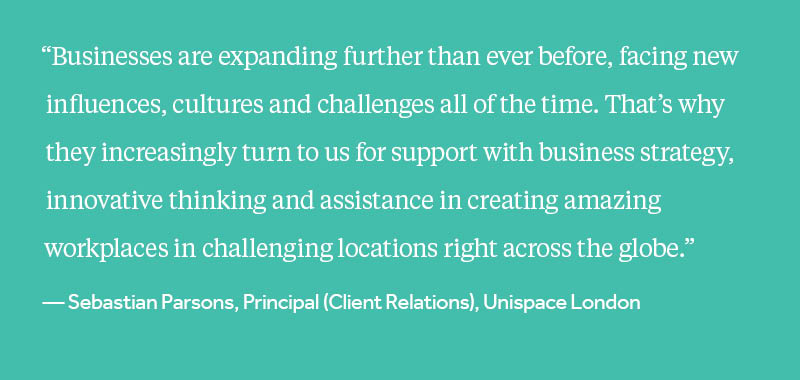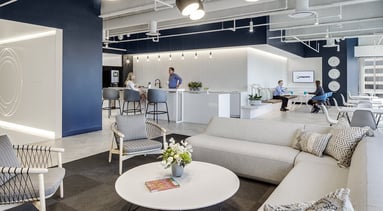
Over the last few weeks, we've been looking at the impact of Brexit on where businesses choose to locate. However, the fact is that no business ever stands still. Multiple, ever-changing external factors continually affect where a business is located and how its workspaces function.
The unfolding evolution of each business and brand demands regular reviews of their workspace locations and activities, as well as the associated productivity and costs. Here are 12 key examples – and if you're interested to know more about our explorations of London, Paris, Frankfurt, Madrid and Dublin, check back within this blog series.
People factors
-
Availability and cost of talent – how young, how well-educated and how experienced is the local workforce? What industries are people in; what universities or centres of innovation are there? What's the trajectory for labour costs? We found strengths across the board in Dublin.
-
Liveability – employees asked to relocate will be looking carefully at the quality and cost of living. How good are homes, schools and healthcare? What about social and leisure facilities; what are the local crime rates? Madrid looks very tempting, although London and Paris will always be firm favourites.
-
The internal brand (employee-facing) – as businesses compete to be destination employers, wellbeing benefits and services such as gyms, shops, rest areas, shower-rooms and crèches need factoring into the workplace footprint, strategy and design.
-
Changing workforces – factors such as technology can affect where people are based. For example, surveyors who once worked only outdoors may now work mostly at a desk, while automation or specialisation can affect headcount.
Commercial factors
-
Growth and economic performance – even within the EU, this can vary substantially, although there is the advantage of currency stability. With Spain and Ireland leading the way in economic growth in Europe (especially in the context of recovery), we found Madrid and Dublin well worth a closer look.
-
Financial incentives, advantageous tax rates and low barriers to trade – Dublin excels through its own determination to appeal, while Paris – historically notoriously problematic – has been busy dismantling a wide range of restrictive regulations and improving the ease of doing business there.
-
Proximity to markets – access to major business and consumer centres, plus efficient transport and connectivity, will always appeal. Centrally located Western European cities such as Frankfurt and Berlin stand out, while Madrid has the advantage of strong links with Latin America.
-
Access to commercial property at affordable rates – London and Dublin are seeing heavy investment in office space, with 2 million and 5.7 million sq ft under construction respectively. As for costs, with many major European cities commanding an average of over €50 per sqm, Madrid appeals at just €29.
Geopolitical factors
-
Political maturity and stability – of primary concern, along with commitment to democracy and openness (especially in non-traditional and emerging economies). These are often considered hand-in-hand with local culture, societal diversity and tolerance. However, even well-developed Western economies can throw curveballs – with Brexit a very notable example, although London has proved surprisingly resilient.
-
Regulatory demands – for example, the protection of data (and access to it), or the legalities of financial transactions, may locate businesses where they might not otherwise have chosen. Frankfurt and Luxembourg City may well appeal.
-
The economic barometer – recent austerity has had a dramatic effect on the global business landscape; on the other hand, emerging economies such as Indonesia, Turkey and Argentina are drawing investment at the expense of more traditional regions.
-
Geophysical events – earthquakes, floods and wildfires are a fact of life and can force relocation, as Unispace saw when we helped BNZ relocate in Wellington after the quake of 2016. Climate change is only likely to increase the number of geophysical factors to consider.
Clearly, there's a lot to think about, and we'd go so far as to say that the pace of workspace change is accelerating. At Unispace, the fact that we put strategy at the heart – and the start – of our Think, Create, Make methodology means we're in the ideal position to advise our clients.

The fact that we're based in 49 studios on 5 continents means that not only can we deliver your workspaces wherever you are, but we also have a bird's-eye view of the global office workspace market. We spot changes and trends before our clients can, providing solutions ahead of the point at which the need for change becomes critical. We also know from our own experience what it takes to set up a business in, say, Buenos Aires, Dubai or Singapore – and how to roll out a global brand within a local context.
According to Barry Anderson, Unispace's Regional Principal for Delivery, our international presence also has other advantages.
"If you're new in-country, you don't have the contractor contacts, and you don't know local regulations or ways of working. But when Unispace handles your delivery, we do it all in-house. There's no handover headache between contractors, no conflicting vision or schedules, less disruption – just a faster, more cost-effective and seamless project from inception to move-in date and beyond. When you have plenty else to be thinking about, that's a huge relief."
We hope you've found this series helpful. If you'd like to explore your own approach to the strategy, design and delivery of your workspaces, please do get in touch.



